Hyundai i10 vs Maxus Deliver 7 - Differences and prices compared
Costs and Efficiency:
Looking at overall running costs, both models reveal some interesting differences in everyday economy.
Hyundai i10 has a convincingly advantage in terms of price – it starts at 14600 £, while the Maxus Deliver 7 costs 30600 £. That’s a price difference of around 16027 £.
Fuel consumption also shows a difference: Hyundai i10 manages with 4.90 L and is therefore convincingly more efficient than the Maxus Deliver 7 with 8 L. The difference is about 3.10 L per 100 km.
Engine and Performance:
Power, torque and acceleration say a lot about how a car feels on the road. This is where you see which model delivers more driving dynamics.
When it comes to engine power, the Maxus Deliver 7 has a clearly edge – offering 353 HP compared to 90 HP. That’s roughly 263 HP more horsepower.
In acceleration from 0 to 100 km/h, the Maxus Deliver 7 is convincingly quicker – completing the sprint in 7.20 s, while the Hyundai i10 takes 11.40 s. That’s about 4.20 s faster.
In terms of top speed, the Hyundai i10 performs slight better – reaching 175 km/h, while the Maxus Deliver 7 tops out at 160 km/h. The difference is around 15 km/h.
There’s also a difference in torque: Maxus Deliver 7 pulls convincingly stronger with 515 Nm compared to 172 Nm. That’s about 343 Nm difference.
Space and Everyday Use:
Whether family car or daily driver – which one offers more room, flexibility and comfort?
Seats: Hyundai i10 offers noticeable more seating capacity – 5 vs 3.
In curb weight, Hyundai i10 is decisively lighter – 996 kg compared to 2360 kg. The difference is around 1364 kg.
In maximum load capacity, the Maxus Deliver 7 performs decisively better – up to 7200 L, which is about 6150 L more than the Hyundai i10.
When it comes to payload, Maxus Deliver 7 clearly takes the win – 1140 kg compared to 423 kg. That’s a difference of about 717 kg.
Who comes out on top?
Overall, the Maxus Deliver 7 shows itself to be outperforms in nearly all aspects and secures the title of DriveDuel Champion.
It convinces with the more balanced overall package and proves to be the more versatile choice for everyday use.

Maxus Deliver 7
Costs and Consumption
View detailed analysis
Engine and Performance
View detailed analysis
Dimensions and Body
View detailed analysis
Hyundai i10
The Hyundai i10 is a cheeky city car that squeezes big-car confidence into a pocket-friendly package, carving through tight streets with surprising composure and sensible practicality. For buyers after low fuss, sensible equipment and wallet-friendly running costs, it's a smart, no-nonsense pick that makes sense whether you're a first-time driver or need a reliable second car.
details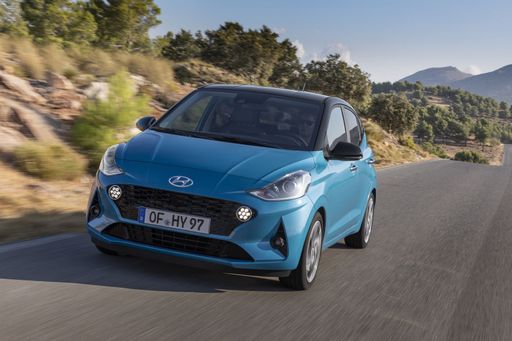 @ Hyundai Motor Company
@ Hyundai Motor Company
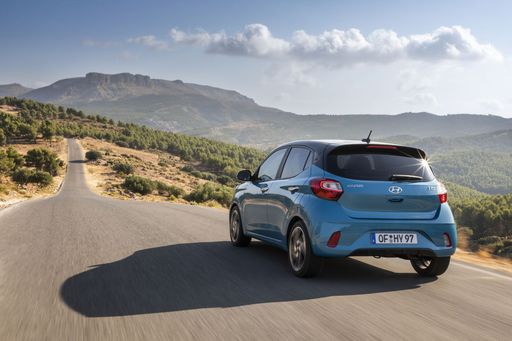 @ Hyundai Motor Company
@ Hyundai Motor Company
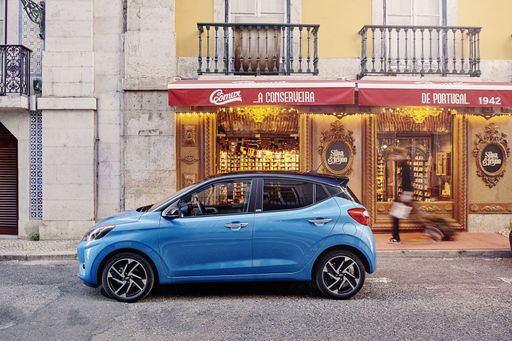 @ Hyundai Motor Company
@ Hyundai Motor Company
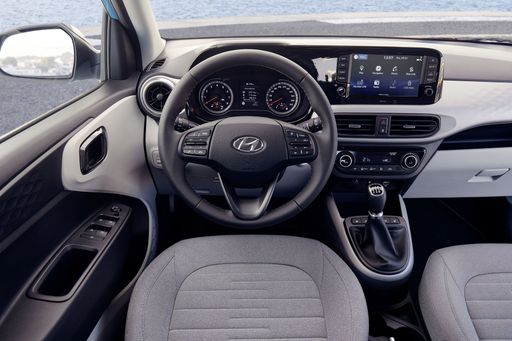 @ Hyundai Motor Company
@ Hyundai Motor Company
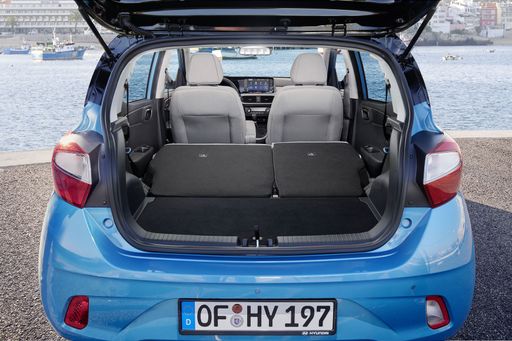 @ Hyundai Motor Company
@ Hyundai Motor Company
Maxus Deliver 7
The Maxus Deliver 7 shows up like the sensible workhorse every small fleet owner secretly wants, marrying a cavernous load area with a surprisingly composed drive that turns city streets into a stress-free route. It won't win any beauty contests, but with practical ergonomics, low running costs and a no-nonsense attitude, it makes delivery days feel less like a slog and more like efficient business.
details
 @ Hyundai Motor Company
@ Hyundai Motor Company
|
|
|
|
|
Costs and Consumption |
|
|---|---|
|
Price
14600 - 19000 £
|
Price
30600 - 53000 £
|
|
Consumption L/100km
4.9 - 5.5 L
|
Consumption L/100km
8 L
|
|
Consumption kWh/100km
-
|
Consumption kWh/100km
26.9 - 28.2 kWh
|
|
Electric Range
-
|
Electric Range
310 - 370 km
|
|
Battery Capacity
-
|
Battery Capacity
-
|
|
co2
110 - 124 g/km
|
co2
0 - 211 g/km
|
|
Fuel tank capacity
36 L
|
Fuel tank capacity
-
|
Dimensions and Body |
|
|---|---|
|
Body Type
Hatchback
|
Body Type
Cargo Van
|
|
Seats
4 - 5
|
Seats
3
|
|
Doors
5
|
Doors
4
|
|
Curb weight
996 - 1099 kg
|
Curb weight
2360 - 2595 kg
|
|
Trunk capacity
252 L
|
Trunk capacity
-
|
|
Length
3670 - 3675 mm
|
Length
4998 - 5372 mm
|
|
Width
1680 mm
|
Width
2030 mm
|
|
Height
1480 - 1483 mm
|
Height
1990 - 1999 mm
|
|
Max trunk capacity
1050 L
|
Max trunk capacity
5900 - 7200 L
|
|
Payload
344 - 423 kg
|
Payload
905 - 1140 kg
|
Engine and Performance |
|
|---|---|
|
Engine Type
Petrol
|
Engine Type
Electric, Diesel
|
|
Transmission
Manuel, Automatic
|
Transmission
Automatic, Manuel
|
|
Transmission Detail
Manual Gearbox, Automated Manual
|
Transmission Detail
Reduction Gearbox, Manual Gearbox
|
|
Drive Type
Front-Wheel Drive
|
Drive Type
Front-Wheel Drive, All-Wheel Drive
|
|
Power HP
63 - 90 HP
|
Power HP
148 - 353 HP
|
|
Acceleration 0-100km/h
11.4 - 18.4 s
|
Acceleration 0-100km/h
7.2 - 11.6 s
|
|
Max Speed
143 - 175 km/h
|
Max Speed
120 - 160 km/h
|
|
Torque
93 - 172 Nm
|
Torque
330 - 515 Nm
|
|
Number of Cylinders
3 - 4
|
Number of Cylinders
4
|
|
Power kW
46 - 66 kW
|
Power kW
108 - 260 kW
|
|
Engine capacity
998 - 1197 cm3
|
Engine capacity
1996 cm3
|
General |
|
|---|---|
|
Model Year
2024
|
Model Year
2024 - 2025
|
|
CO2 Efficiency Class
C, D
|
CO2 Efficiency Class
A, G
|
|
Brand
Hyundai
|
Brand
Maxus
|
Is the Hyundai i10 offered with different drivetrains?
The Hyundai i10 is offered with Front-Wheel Drive.
The prices and data displayed are estimates based on German list prices and may vary by country. This information is not legally binding.
